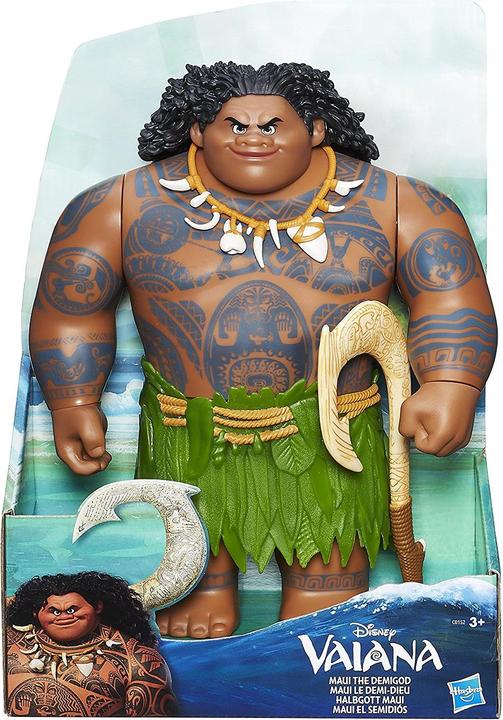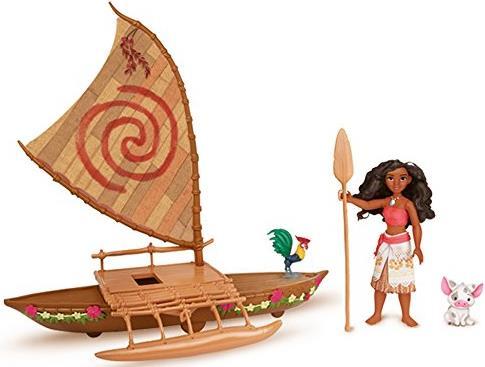
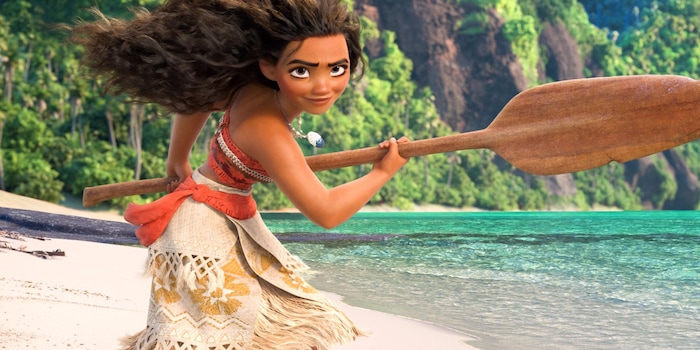
Vaiana - The heroine we need right now
2016 was full of bad news. Some hope is in order. That hope is brought to us by a heroine on an outrigger canoe. Vaiana is the Disney heroine the world needs right now. A review.
Disney and princesses go together like horses and riders. In recent years, however, critics have questioned the concept of princesses. They are too passive. They represented role models that were too traditional. The animation company has therefore set out to change the stereotype of the princess. With "Frozen", the company made a start and landed a hit with "Let it go" that we will probably never get rid of. With "Vaiana", the company wants to do the same.
After attending a secret preview screening, I can say that the film is better than "Frozen" and gives both children and adults hope, inspiration and a good mood.
Race against the clock
There is nothing wrong with the life of Vaiana (Auli'i Cravalho). She lives on a Polynesian island where there is enough to eat and no conflict. But the young woman longs for the sea. Ever since she was a small child, the ocean has been her ally. The reason for this is an experience she had as a little girl. After a scary story - which also explains the film's backstory - she goes to the beach to pick up a shell, but stops when she sees a small sea turtle that wants to go into the sea. The little shellfish has been declared a snack by a flock of birds. But Vaiana rushes to the rescue and the ocean has her to thank and has been on her side ever since.
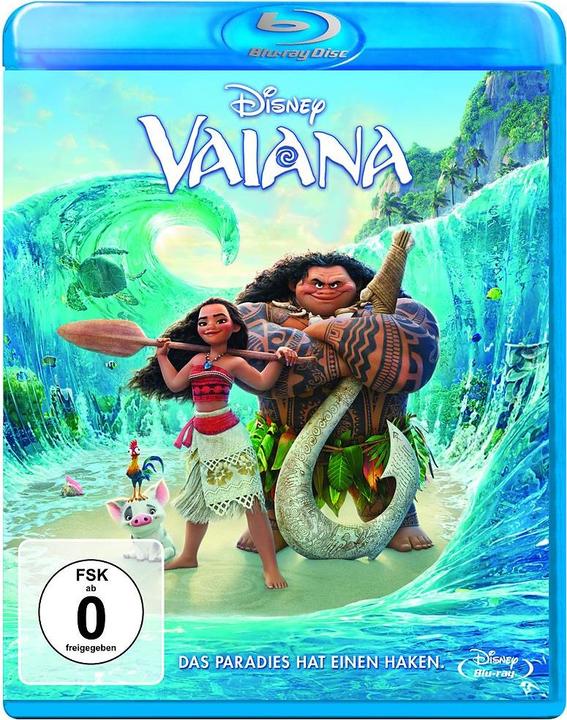
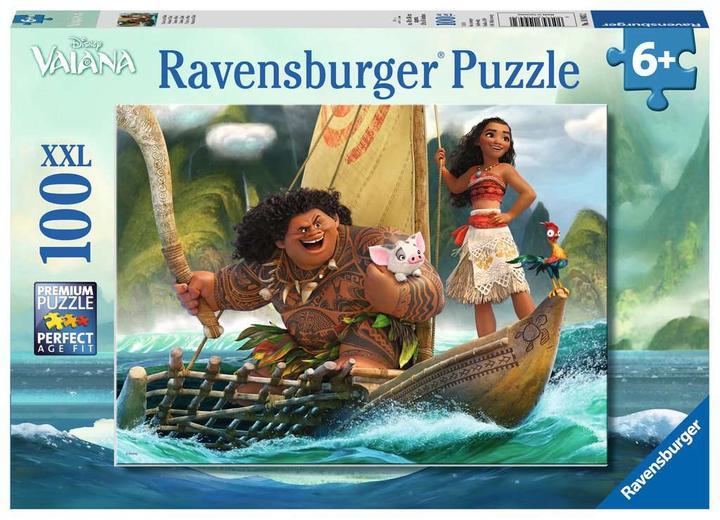
Ravensburger Vaiana and Maui
100 pieces
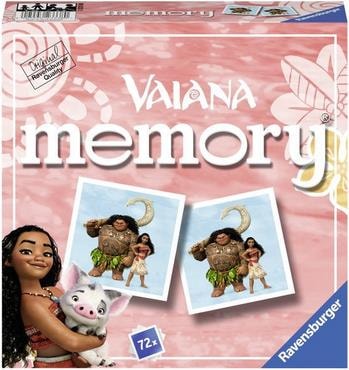
The problem: the chief of the tribe on Mata Nui has decreed that no one is allowed to sail beyond the reef, which is only a few hundred metres off the island.
But more trouble on the horizon! Long before Vaiana has thought about sailing out to sea, the demigod Maui (Dwayne Johnson) has stolen the goddess Te Fiti's heart in the form of a Pounamu stone. As a result, the world is corrupted. It seems that Vaiana - in the best Disney tradition - has no choice. She has been chosen by the ocean, she is the rebel of her tribe.
But what if Vaiana can't do all that? Because somehow the mission seems too big for her to tumble from event to event in Frozen style.
Hard lessons well told
Vaiana doesn't fool the audience, neither children nor adults. Nothing is glossed over, especially not failure. Because the characters in the film, although extremely likeable, make mistakes. They experience bitter setbacks and have to pick themselves up. Sometimes that's not easy.
When Maui realises that even he - the heroic demigod with a big ego - can make mistakes. Or can lose. In the fight against the lava monster Te Kā, he goes down in the first round. Vaiana realises that she can't sail, even though she longs for the ocean. And perhaps Vaiana and Maui are not the pair to help each other.
Then, in the words of Swiss runner Anita Weyermann: "Gring ache u seckle".
If we stay with Disney, then Auli'i Cravalho, the voice of Vaiana, can express this in the song "How Far I'll Go".
Every turn I take, every trail I track
Is a choice I make, now I can't turn back
From the great unknown, where I go alone, where I long to be
German: "Every turn I make; every path I take is a choice I make. I can't turn back now. The great unknown, where I go alone, is where I want to be". I'm sure the German version of the song will actually rhyme, but I'm a journalist, not a songwriter.
Sometimes, people, we all have to bite the bullet. Maybe life is a bit daft sometimes. Maybe sometimes we just have to do things on our own. Maybe we fail, maybe we lose. But this is our life and it goes on.
In short: Vaiana does away with the tiresome "you're a very special snowflake" cliché and is a heart-warming reminder of humanity beyond any labels and that we can also be good on our own and without magic. It shows that we can and can accept help, but that we are ultimately responsible for ourselves. But if you don't learn to feel the wind, read the current and tie knots, then you will never become a sailor. As "Vaiana" is a Disney film, this lesson is not simply imposed, but conveyed with charm, love and warmth.
Polynesia in focus
In developing the story and look of the film, the authors and directors took inspiration from the culture of the Polynesians and kept it largely intact, even if not every little shred is explained. The importance of the tā moko or tatau, the tattoos of the Polynesians, is only touched on superficially, just the way culture is lived.
But I don't want to withhold one detail from you, because it's just cool. It's about the scenes in front of which Maui goes into battle. To the untrained eye, he seems to be having a bit of a fidgeting fit and is shouting crazy things. However, it's not just confused twitching but a so-called haka.
The haka is a type of dance performed by Māori men and women on special, extraordinary and intense occasions. Whether it is to greet or bid farewell to a valued guest or dignitary, or to declare war, a haka is an intense display of a person's emotions.
Since tribal warfare has largely died out, the custom has also been somewhat forgotten. But the New Zealand rugby players of the All-Blacks have made the custom respectable again. Before every game, they line up on the pitch and shout their warlike intentions at their opponents. This is often not just a haka from the old days - like the one shown above with the title "Ka Mate" - but sometimes written especially for the team.
Other occasions when a haka is danced:
The text of probably the best-known haka is that of "Ka Mate". The text of the main part is as follows:
Ka mate, ka mate! ka ora! ka ora!
Ka mate! ka mate! ka ora! ka ora!
Tēnei te tangata pūhuruhuru
Nāna nei i tiki mai whakawhiti te ā
Ā, upane! ka upane!
Ā, upane, ka upane, whiti te ra!
Translated this means:
This is death, this is death! This is life, this is life!
This is death, this is death! This is life, this is life!
This is the hairy man,
who brought the sun and made it shine!
One step up, one more step up!
One step up, one more step up, the sun is shining!
In the text, the author Te Rauparaha (1760s - 27 November 1849), chief of the Ngāti Toa tribe, sings about his escape from hostile tribesmen of the Ngāti Maniapoto and Waikato. He hid in a pit and when he climbed out, he saw a tribal chief who was friendly to him. This is the hairy man.
And with these words, I release you into today's world, which desperately needs heroines like Vaiana. People like you and me, who sometimes fail and still keep going. People who are strong enough to realise that their dreams and their realisation require a lot of work. With this in mind: He kai kei aku ringa! Kia pai te haere!
If you are one of those who, for some inexplicable reason, really want a German trailer... voilà.
Journalist. Author. Hacker. A storyteller searching for boundaries, secrets and taboos – putting the world to paper. Not because I can but because I can’t not.
Interesting facts about products, behind-the-scenes looks at manufacturers and deep-dives on interesting people.
Show all